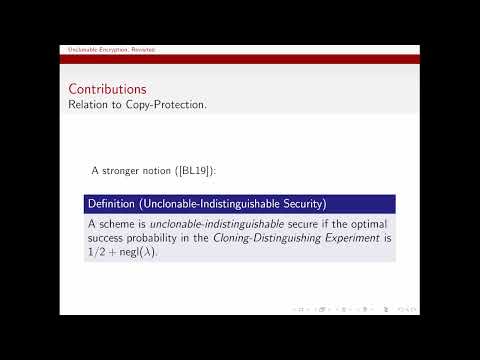CryptoDB
Unclonable Encryption, Revisited
| Authors: | |
|---|---|
| Download: | |
| Abstract: | Unclonable encryption, introduced by Broadbent and Lord (TQC'20), is an encryption scheme with the following attractive feature: given a ciphertext, an adversary cannot create two ciphertexts both of which decrypt to the same message as the original ciphertext. We revisit this notion and show the following: -Reusability: The constructions proposed by Broadbent and Lord have the disadvantage that they either guarantee one-time security (that is, the encryption key can only be used once to encrypt the message) in the plain model or they guaranteed security in the random oracle model. We construct unclonable encryption schemes with semantic security. We present two constructions from minimal cryptographic assumptions: (i) a private-key unclonable encryption scheme assuming post-quantum one-way functions and, (ii) a public-key unclonable encryption scheme assuming a post-quantum public-key encryption scheme. -Lower Bound and Generalized Construction: We revisit the information-theoretic one-time secure construction of Broadbent and Lord. The success probability of the adversary in their construction was guaranteed to be $0.85^n$, where $n$ is the length of the message. It was interesting to understand whether the ideal success probability of (negligibly close to) $0.5^n$ was unattainable. We generalize their construction to be based on a broader class of monogamy of entanglement games (while their construction was based on BB84 game). We demonstrate a simple cloning attack that succeeds with probability $0.71^n$ against a class of schemes including that of Broadbent and Lord. We also present a $0.75^n$ cloning attack exclusively against their scheme. -Implication to Copy-Protection: We show that unclonable encryption, satisfying a stronger property, called unclonable-indistinguishability (defined by Broadbent and Lord), implies copy-protection for a simple class of unlearnable functions. While we currently don't have encryption schemes satisfying this stronger property, this implication demonstrates a new path to construct copy-protection. |
Video from TCC 2021
BibTeX
@article{tcc-2021-31566,
title={Unclonable Encryption, Revisited},
booktitle={Theory of Cryptography;19th International Conference},
publisher={Springer},
doi={10.1007/978-3-030-90459-3_11},
author={Prabhanjan Ananth and Fatih Kaleoglu},
year=2021
}

